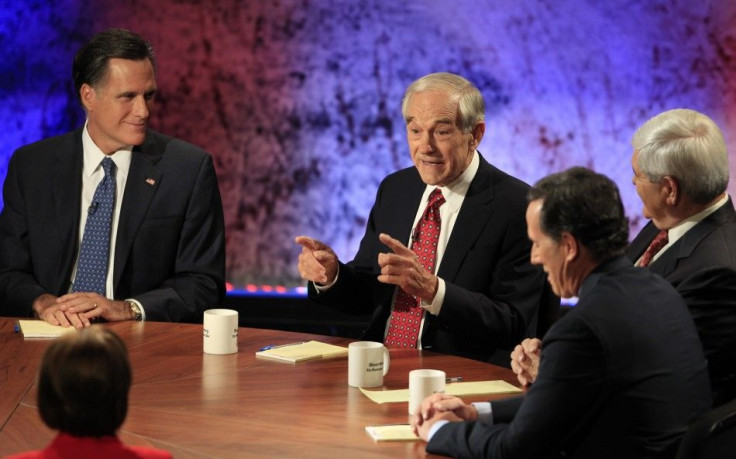Tax Return Issue Spells Trouble for Romney’s Chances Against Ron Paul, Gingrich

Mitt Romney is finding it hard to wade through the attacks from his Republican rivals over his tax returns.
Romney's hesitance to disclose his tax returns and his wealth profile seems to be costing him dearly.
The recent CNN/Times poll shows that his margin with his nearest Republican rival Newt Gingrich has shrunk to 10 points. Romney had enjoyed a 19 point lead in the past week.
His Republican rivals and Democrat candidate Barack Obama have repeatedly asked Romney to furnish his tax returns. Bowing to the pressure, he recently indicated that his current tax rate is close to 15 percent. However, he still refuses to make the tax returns public till April.
This has created quite a stir among his opponents, who have criticized him for his proposed tax plans and his own record, which they allege are pro-rich.
In fact, Gingrich has now effectively backed off from criticizing Romney's Bain Capital days and is now targeting Romney's tax records. The strategy seems working, as Gingrich is surging while Romney's support slides.
His critics say that Romney's vehement refusals to disclose his tax returns indicate that he has something serious to hide from the public.
Whatever information he has shared right now also points to the fact that he will have to face stronger criticism once he discloses his tax returns. The little information that he has shared now is not enough to give a clear picture of his tax returns, but is enough to judge that a larger chunk of his income comes from capital gains.
Romney is considered one of the richest presidential candidates in modern times with an estimated fortune of $190-$250 million, according to a New York Times report. He has made millions of dollars from Bain capital and still receives a share of its earnings as an investor.
Romney maintains that he has nothing to hide about his wealth. If that is true, then why is Romney, already battling criticism for his Bain Capital days, providing further arsenal to his rivals by refusing to disclose returns?
It may be difficult to pinpoint all the reasons why Romney is hesitant regarding tax returns now. Still it is anybody's guess that his refusal has links to his proposed tax plan, his personal wealth profile and the fear that it may project him in bad light as a billionaire who has benefited from the pro-rich tax plans in the U.S.
His tax rate clearly indicates that he makes his fortune through capital gains rather than from wage or salary-related income because, according to the current tax cut plans, capital gains are taxed at 15 percent while income from wages and salaries are taxed at higher rates which go up to 35 percent.
So though he makes millions and is reportedly a wealthier person, he is taxed at lower rates. At the same time, millions of middle-class salaried Americans are forced to pay higher taxes. If that stands true, then he is among the 1 percent of Americans who enjoy the benefits of a taxing system that is pro-rich. This will definitely not do Romney's image any good as a presidential candidate for the majority of middle-class Americans, occupy protesters and others, who are fighting to remove tax cuts favoring the rich.
The media reports also indicate that he and Bain Capital, in which he is an investor, has stashed millions of dollars in the tax havens abroad. There is nothing illegal in investing offshore, but at the same time it is not to the interest of America or Americans.
One of the arguments made in favor of charging lower tax on capital gains is that such benefit will increase further investments resulting in job creation. Now Romney will find it more difficult to justify his investments abroad as he stands as the perfect example of the loopholes in American taxation that the rich are exploiting for their individual benefits.
Another important factor is his proposed taxing plan, which favors Bush-era-tax cuts. It is the Bush-era-tax cuts that have reduced the tax on capital gains to 15 percent. If not extended this year, the rate of tax for capital gains will return to 20 percent while the rate of dividend income will reach 39.6 percent in 2013.
Romney's proposed economic strategy clearly indicates that he is all for continuing the Bush-era-tax cuts that will benefit rich investors like him, as they will be taxed less.
All this will provide ample fodder to his rivals who are already pouncing on him for his corporate records. Romney will have a tough time defending himself and his economic policies if he pays lower taxes and will weaken his position against Obama who has always been critical of Bush-era-cuts.
His entire Republican rivals pay taxes at much higher rates than him. This for sure doesn't cast him in a positive light against candidates like Ron Paul who have proven pro-people records. Ron Paul had even declined to accept monetary and federal benefits on various occasions.
Gingrich, Rick Santorum and Rick Perry too are better positioned to attract salaried class voters than Romney. Since the salaried class is a deciding force in American Election, Romney seems to be in great trouble.
© Copyright IBTimes 2024. All rights reserved.












